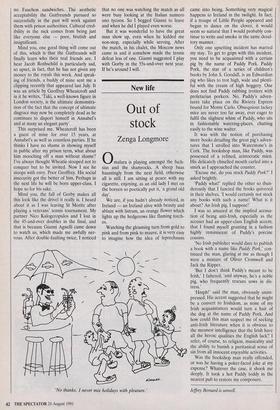New life
Out of stock
Zenga Longmore
0 malara is playing amongst the fuch- sias and the shamrocks. A sheep Baas hauntingly from the next field, otherwise all is still. I am sitting at peace with my cigarette, enjoying, as an old lady I met on the boreen so poetically put it, 'a grand old day'.
We are, if you hadn't already noticed, in Ireland — an Ireland alive with beauty and ablaze with listram, an orange flower which lights up the hedgerows like flaming torch- es.
Watching the gloaming turn from gold to pink and from pink to mauve, it is very easy to imagine how the idea of leprechauns `No thanks, I never ?nix holidays with pleasure.' came into being. Something very magical happens to Ireland in the twilight. In fact, if a troupe of Little People appeared and began to dance on the clover, it would seem so natural that I would probably con- tinue to write and smoke in the same desul- tory manner.
Only one upsetting incident has marred my stay. To get to grips with this incident, you need to be acquainted with a certain pig by the name of Paddy Pork. Paddy Pork, the star of a series of children's books by John S. Goodall, is an Edwardian pig who likes to trot high, wide and plenti- ful with the cream of high hoggery. One does not find Paddy rubbing trotters with proletarian porkers. No. Paddy's adven- tures take place on the Riviera Express bound for Monte Carlo. Obsequious lackey mice are never too far away, ever eager to fulfil the slightest whim of Paddy, who sits in fashionable watering-places, chatting easily to the wine waiter.
It was with the notion of purchasing more books detailing the great pig's adven- tures that I strolled into Waterstone's in Cork. The bookshop man, like Paddy, was possessed of a refined, aristocratic mien. His delicately chiselled mouth curled into a smirk as I approached the counter.
`Excuse me, do you stock Paddy Pork?' I asked brightly.
`Paddy what!' replied the other so thun- derously that I fancied the books quivered in their shelves. 'I would certainly not stock any books with such a name! What is it about? An Irish pig, I suppose!'
I was so amazed at the implied accusa- tion of being anti-Irish, especially as the accuser had an upper-class English accent, that I found myself grunting in a fashion highly reminiscent of Paddy's porcine cousins.
`No Irish publisher would dare to publish a book with a name like Paddy Pork,' con- tinued the man, glaring at me as though I were a mixture of Oliver Cromwell and Jack the Ripper.
`But I don't think Paddy's meant to be Irish,' I faltered, 'and anyway, he's a noble pig, who frequently rescues sows in dis- tress.'
limphr said the man, obviously unim- pressed. His accent suggested that he might be a convert to Irishdom, as none of my Irish acquaintances would turn a hair of the dog at the name of Paddy Pork. And how could this man suspect me of seeking anti-Irish literature when it is obvious to the meanest intelligence that the Irish have all the heroic qualities the English lack? I refer, of course, to religion, musicality and the ability to banish a puritanical sense of sin from all innocent enjoyable activities.
Was the bookshop man really offended, or was he having a poker-faced joke at my expense? Whatever the case, it shook me deeply. It took a hot Paddy toddy in the nearest pub to restore my composure.


















































 Previous page
Previous page